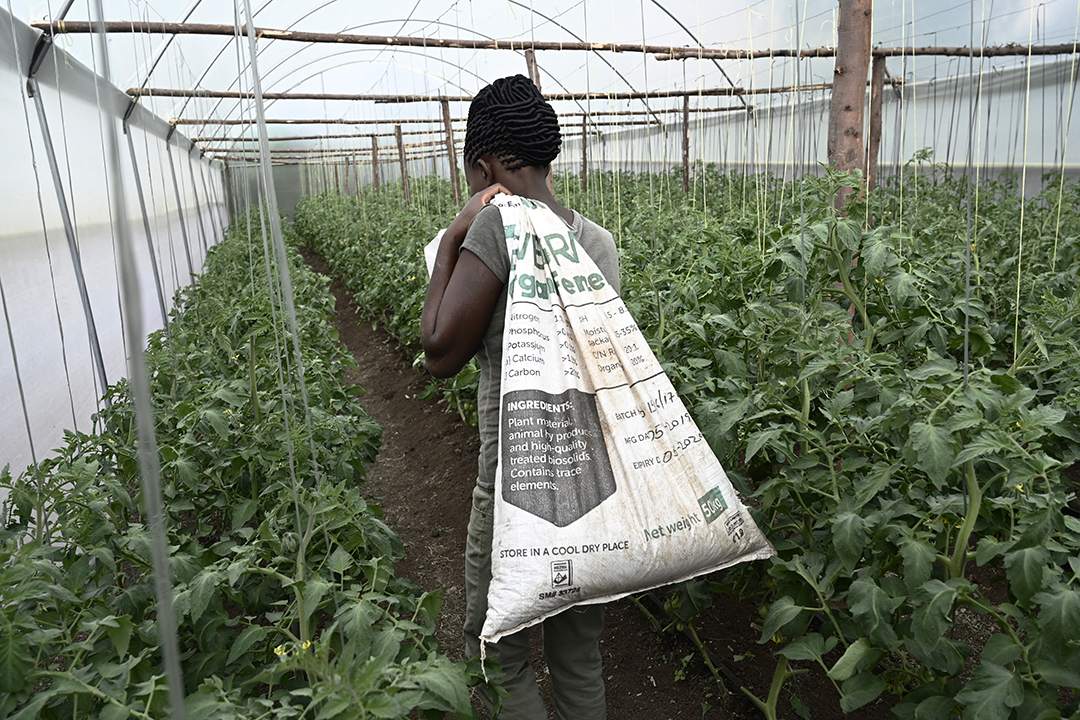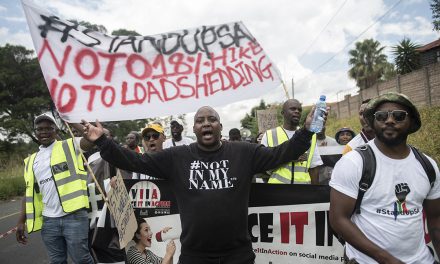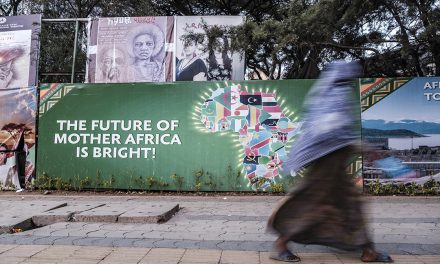Rising food and fertiliser prices have sparked debate among analysts about the dependency of the African continent on food and agricultural imports, and its sensitivity to external geopolitical shocks. Are mechanisms in place to counter these shocks and, if not, what can be done to better prepare national and regional governments facing these issues?

Elizabeth Wahito carries a sack of organic fertiliser from Sanergy, a company that turns sanitation waste into organic fertiliser, to fertilise her tomato plants. In Naivasha near Nairobi, 9 August 2019. Photo: Simon Maina/AFP
In a recent interview, the director of the World Food Programme, David Beasley, said that for every 1% increase in hunger, there is a 2% increase in migration. If true, the sharp rise in hunger across the African continent has serious implications for regional stability and post-Covid socioeconomic recovery.
Before Russia’s war on Ukraine, a global food crisis was well underway. For example, East Africa has endured one of the worst droughts witnessed in decades, with nearly 20 million people at risk of severe hunger.
The lingering effect of the Covid-19 pandemic, rising fuel prices, violent conflict and climate shocks are just some of the major drivers of hunger in Africa. The war in Ukraine has restricted the export of a critical crop, wheat. The World Food Programme gets half their supply of wheat from Ukraine, relying heavily on its stocks for its emergency feeding programmes in Africa and around the world.
The port of Odessa in southern Ukraine holds grain silos with millions of metric tons of wheat meant for export. Russia block of the port puts another 50 million people at risk of acute hunger in sub-Saharan Africa.
Furthermore, Western sanctions on Russia have disrupted the supply of key fertilisers, some of which Russia is the largest supplier in the world. Sanctions restricting Russia’s sale of fertiliser will have an effect on farmers in Africa, resulting in more food shortages.
High fertiliser prices mean that farmers will have to scale back on how much they are able to produce for the next harvest season. Smaller harvests will reduce profit margins and food prices will continue to rise. This situation disproportionately affects African countries that depend on fertiliser imports and who have limited fiscal support from their governments.
Also, farmers in sub-Saharan Africa have been severely affected by more frequent extreme weather events. These factors, compounded, put populations already experiencing food insecurity at risk of famine-like conditions. But this situation also presents an opportunity for the continent to reform and diversify its agricultural sector.
African governments and large-scale farmers are purchasing fertiliser at the wrong time, according to global fertiliser price cycles. Fertiliser tenders operate in difficult government processes which have long lead times, or the fertilisers purchased are not appropriate for the crops.
The African Development Bank’s Africa Fertiliser Financing Mechanism (AFFM) has recently become a central player in promoting climate-smart agriculture that does not rely on heavy fertiliser inputs and the use of technology. In 2021, the AFFM’s Technologies for African Agricultural Transformation initiative gained international recognition for delivering agricultural technologies to 11 million smallholder farmers in 30 African countries. The initiative hoped to improve farmers’ productivity and resilience against the effects of climate change.
There is great potential for several African countries such as Zambia, Malawi and the Democratic Republic of Congo to become significant food exporters. In particular, grains such as millet and sorghum (as well as fruit and vegetables) have great potential in these regions where there is arable land.
Thus, wheat may not necessarily be the answer to Africa’s food security woes. There is evidence to suggest some cereals, such as wheat, remain difficult to grow despite their “climate-smart” status and technological inputs. Soil erosion and acidification remain risk factors where intensive monoculture farming takes place. This is where a diversified approach must be considered alongside collaboration with smallholder farmers who have expert knowledge of traditional farming practices on crops widely grown such as millet and sorghum.
Input-intensive solutions also only solve one part of the food security problem. Questions about access to markets or whether the seeds chosen will be consumed are critical if farmers are to stay out of debt. An alternative model for food production where farmers and land are vulnerable to commodity shocks should be considered to avoid a cycle of uncertainty in the industry.
Russian President Vladimir Putin met the African Union chairperson, President Macky Sall of Senegal, on 3 June this year to discuss expanding the political dialogue between Russia and the AU as well as the humanitarian and economic effects of Russia’s invasion of Ukraine on African states. Putin acknowledged the food shortages caused by the conflict and, according to Sall, he expressed a “willingness to facilitate the export of Ukrainian cereals”. Prior to their engagement, Putin emphasised his demands for the suspension of Western sanctions but it’s unclear whether the easing of sanctions would assist in allowing shipments to leave port.
G7 countries announced new sanctions on Russian gold imports and expect to target its ability to import weapons. The G7 also met India, South Africa and Indonesia to discuss the wider effects of the war and sanctions on food and fuel supplies. Russia’s economic, political and military ties with African states have steadily increased over the past decade. The AU and its partner regional development organisations must continue to foster independence across the agricultural industry by investing in development solutions that are financially sustainable and ecologically sound.
A recent report by the Food and Agriculture Organisation indicates that sub-Saharan Africa registered the lowest agricultural expenditure by governments (except for Malawi and Mali). This shortfall has a significant effect on the ability of the agricultural sector to successfully develop.
Furthermore, the lack of multi-sectoral coordination across government departments and civil society organisations has been identified as another key limitation in developing a sustainable agricultural industry across the African continent. The 2014 Malabo Declaration was a recommitment by AU heads of state and governments to enhance the resilience of livelihoods and food systems by providing effective leadership on achieving food security and agricultural productivity for its member states. More recently, the AU’s Agriculture, Rural Development, Blue Economy and Sustainable Environment division published its Africa Regional Nutrition Strategy 2015-2025 report with the aim of providing systematic and consistent support to eliminate problems of hunger and malnutrition on the continent.
“Nutrition governance”, as the AU coins it, is the key element that governments must define and implement in policy for the action plan to succeed across all sectors of food production. The promotion and monitoring of these nutrition governance strategies will be undertaken by the African Peer Review Mechanism and the African Committee on the Rights and Welfare for the Child. While the institutional capacity of its member states remains a problem, the AU does appear to be acutely aware of the continent’s agricultural industry’s shortfalls and has mapped out a pathway to mitigate these global shocks.
Originally published in the Mail and Guardian Thought Leader on 1 July 2022
Monique Bennett holds a Master’s degree in International Relations from the University of the Witwatersrand. She is currently pursuing her Doctorate in Political Science at Stellenbosch University funded by the Peace Research Institute of Oslo. She enjoys a mixed-methods approach to research across topics such as governance, environmental issues, human security and peacebuilding within the African context. She supports her research team by providing data-driven evidence for their research/op-eds and writes for various South Africa news outlets.












